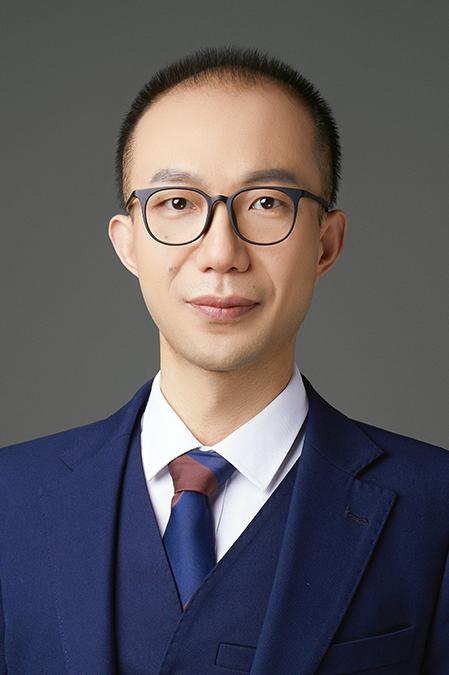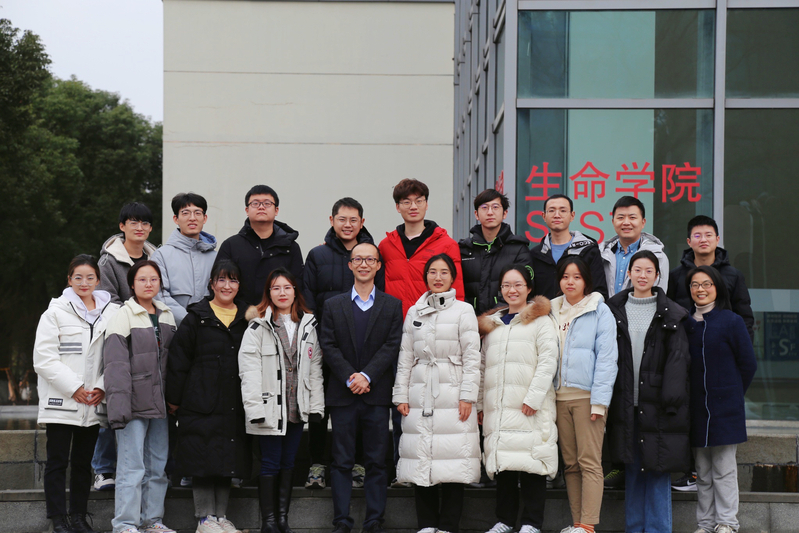Group of DNA Repair, Gene Editing & Gene Therapy
Principal investigator
Name:
Jia ChenProfessor , PhD, Professor
Position:
Director of Gene Editing Center
Affiliation:
School of Life Science and Technology
Honor:
Education Background:
- 1998/09-2002/06, College of Life Science, Nankai University, BS
- 2002/09-2009/04, Shanghai Institute of Biochemistry and Cell Biology, Chinese Academy of Sciences, PhD
Working Experience:
- 2009/07-2014/06, National Institutes of Health, Postdoc Fellow
- 2014/11-2019/09, School of Life Science and Technology, ShanghaiTech University, Assistant Professor (Tenure-Track)
- 2019/10-2024/01, School of Life Science and Technology, ShanghaiTech University, Associate Professor (Tenured)
- 2024/02-Now, School of Life Science and Technology, ShanghaiTech University, Professor (Tenured)
Group Introduction
Research Area:
DNA Repair, Gene Editing and Gene Therapy
Research Interests:
Species survival is closely related to genome stability, which is monitored and maintained by DNA repair pathways. However, cells can initiate error-prone DNA repair under various physiological and pathological conditions. Thus, the fidelity of DNA repair influences aging, evolution, and certain diseases. Genome editing is a type of genetic engineering in which DNA is inserted, deleted, or replaced in the genome of a living organism using engineered nucleases. Utilizing genome editing tools to genetically manipulate the genome of cells and living organisms has broad applications in life sciences research, biotechnology and agricultural technology development, and, most importantly, pharmaceutical and clinical innovation.
Our lab focuses on DNA repair-induced mutagenesis, the development and application of new gene editing systems, and gene editing therapy. We are particularly interested in: (1) DNA repair-induced mutagenesis in gene editing, carcinogenesis, and aging; (2) the development of new gene editing tools; and (3) gene editing therapy for human diseases.
Research Achievement
Our lab revealed the molecular mechanism by which the cytidine deaminase APOBEC induces mutations during CRISPR/Cas9-mediated gene editing has been elucidated. Building on this mechanistic study, multiple novel base editing systems have been developed, including: an enhanced Cas9 base editor (eBE) with high efficiency; a Cpf1 base editor (dCpf1-BE) capable of effective editing in genomic A/T-rich regions; a universal Cas9 base editor (hA3A-BE) demonstrating high efficiency in G/C-rich and hypermethylated regions; a Cas12a base editor (BEACON) with minimal activation of DNA damage response pathways; an enhanced mitochondrial adenine base editor (eTALED); and a high-precision RNA adenine base editor (RtABE). To address off-target risks in clinical applications, a high-precision base editor (transformer BE, tBE) was developed using cytidine deaminase inhibitory proteins. Employing tBE, we achieved the world's first clinical application of base editing for β-thalassemia treatment. To date, this approach has successfully treated patients with β-hemoglobinopathies across multiple countries (including China, Laos, Malaysia, Nigeria and Pakistan). The related drug candidate CS-101 received IND approval for Phase I clinical trials from China's National Medical Products Administration (NMPA) in 2024. Recognized as a groundbreaking advancement in β-hemoglobinopathy treatment, it was featured in the European Hematology Association Congress (EHA2024) Scientific Report.
Representative Publications (*First Author, # Corresponding Author)
- 1. Xiang, Jiangchao*; Xu, Wenchao*; Wu, Jing*; Luo, Yaxin; Liu, Chengyu; Hou, Yaofeng; Chen, Jia#; Yang, Bei#.Structural insights into DdCBE in action enable highprecision mitochondrial DNA editing.MOLECULAR CELL. 18 Sep 2025. 85(18):3357-3372.e9.
- 2. Li, Guangye*; Chen, Guo*; Yuan, Guo-Hua*; Wei, Jia*; Ni, Qingyang; Wu, Jing; Yang, Bei; Yang, Li#; Chen, Jia#.Specific and efficient RNA A-to-I editing through cleavage of an ADAR inhibitor.NATURE BIOTECHNOLOGY. 26 Mar 2025.
- 3. Fan, Yuhang*; Xu, Wenchao; Gao, Bao-Qing; Qin, Huichao; Wu, Xiaoyi; Wei, Jia; Ni, Qingyang; Zhou, Lina; Xiang, Jiangchao; Wu, Jing; Yang, Bei; Yang, Li; Chen, Jia#.Leveraging base excision repair for efficient adenine base editing of mitochondrial DNA.Nature Biotechnology. 25 Mar 2025.
- 4. Chen, Qimingxing*; Chang, Yan*; He, Xiaoyan; Ding, Yan; Wang, Runyuan; Luo, Ran; Yuan, Jialu; Chen, Jiabei#; Zhong, Guisheng; Yang, Huiying; Chen, Jia#; Li, Jianfeng#.Targeted Delivery of mRNA with Polymer-Lipid Nanoparticles for In Vivo Base Editing.ACS NANO. 18 Feb 2025. 19(8):7835-7850.
- 5. Han, Wenyan*; Qiu, Hou-Yuan*; Sun, Shangwu*; Fu, Zhi-Can*; Wang, Guo-Quan*; Qian, Xiaowen*; Wang, Lijie; Zhai, Xiaowen; Wei, Jia; Wang, Yichuan; Guo, Yi-Lin; Cao, Guo-Hua; Ji, Rui-Jin; Zhang, Yi-Zhou; Ma, Hongxia; Wang, Hongsheng; Zhao, Mingli; Wu, Jing; Bi, Lili; Chen, Qiu-Bing; Li, Zifeng; Yu, Ling; Mou, Xiaodun; Yin, Hao; Yang, Li#; Chen, Jia#; Yang, Bei#; Zhang, Ying#.Base editing of the HBG promoter induces potent fetal hemoglobin expression with no detectable off-target mutations in human HSCs.CELL STEM CELL. Nov 2023. 30(12):1624-1639.e8.
- 6. Kim, Jin-Soo*#; Chen, Jia*#.Base editing of organellar DNA with programmable deaminases.NATURE REVIEWS MOLECULAR CELL BIOLOGY. 01 Oct 2023. 25(1):34-45.
- 7. Han, Wenyan*; Gao, Bao-Qing*; Zhu, Junjie*; He, Zongxing*; Li, Jianfeng#; Yang, Li#; Chen, Jia#.Design and application of the transformer base editor in mammalian cells and mice.NATURE PROTOCOLS. 04 Oct 2023. 18(11):3194-3228.
- 8. Zhao, Wenwen*; Li, Jifang*; Wang, Xiao*; Xu, Wei*; Gao, Bao-Qing*; Xiang, Jiangchao; Hou, Yaofeng; Liu, Wei; Wu, Jing; Qi, Qilian; Wei, Jia; Yang, Xiaoyu; Lu, Lu#; Yang, Li#; Chen, Jia#; Yang, Bei#.Prime editor-mediated functional reshaping of ACE2 prevents the entry of multiple human coronaviruses, including SARS-CoV-2 variants.MEDCOMM. 2023. 4(5).
- 9. Li, Xiaosa*#; Zhou, Lina*; Gao, Bao-Qing*; Li, Guangye; Wang, Xiao; Wang, Ying; Wei, Jia; Han, Wenyan; Wang, Zixian; Li, Jifang; Gao, Runze; Zhu, Junjie; Xu, Wenchao; Wu, Jing; Yang, Bei; Sun, Xiaodong#; Yang, Li#; Chen, Jia#.Highly efficient prime editing by introducing same-sense mutations in pegRNA or stabilizing its structure.NATURE COMMUNICATIONS. 29 Mar 2022. 13(1):1669.
- 10. Gao, Runze*; Fu, Zhi-Can*; Li, Xiangyang*; Wang, Ying*; Wei, Jia; Li, Guangye; Wang, Lijie; Wu, Jing; Huang, Xingxu#; Yang, Li#; Chen, Jia#.Genomic and Transcriptomic Analyses of Prime Editing Guide RNA-Independent Off-Target Effects by Prime Editors.CRISPR JOURNAL. Apr 2022. 5(2):276-293.
- 11. Li, Guanglei*; Li, Xiangyang*; Zhuang, Songkuan*; Wang, Liren*; Zhu, Yifan*; Chen, Yangcan*; Sun, Wen*; Wu, Zeguang*; Zhou, Zhuo; Chen, Jia#; Huang, Xingxu#; Wang, Jin#; Li, Dali#; Li, Wei#; Wang, Haoyi#; Wei, Wensheng*#.Gene editing and its applications in biomedicine.SCIENCE CHINA-LIFE SCIENCES. Apr 2022. 65(4):660-700.
- 12. Wang, Lijie*; Xue, Wei*; Zhang, Hongxia*; Gao, Runze*; Qiu, Houyuan*; Wei, Jia; Zhou, Lina; Lei, Yun-Ni; Wu, Xiaocheng; Li, Xiao; Liu, Chengfang; Wu, Jing; Chen, Qiubing; Ma, Hanhui; Huang, Xingxu; Cai, Cheguo; Zhang, Ying; Yang, Bei#; Yin, Hao#; Yang, Li#; Chen, Jia#.Eliminating base-editor-induced genome-wide and transcriptome-wide off-target mutations.NATURE CELL BIOLOGY. May 2021. 23(5):552-563.
- 13. Wang, Xiao*; Ding, Chengfeng*; Yu, Wenxia*; Wang, Ying*; He, Siting*; Yang, Bei*; Xiong, Yi-Chun; Wei, Jia; Li, Jifang; Liang, Jiayi; Lu, Zongyang; Zhu, Wei; Wu, Jing; Zhou, Zhi; Huang, Xingxu; Liu, Zhen#; Yang, Li#; Chen, Jia#.Cas12a Base Editors Induce Efficient and Specific Editing with Low DNA Damage Response.CELL REPORTS. 02 Jun 2020. 31(9).
- 14. Yang, Li*#; Yang, Bei#; Chen, Jia#.One Prime for All Editing.CELL. Dec 2019. 179(7):1448-1450.
- 15. Wang, Ying*; Gao, Runze*; Wu, Jing*; Xiong, Yi-Chun; Wei, Jia; Zhang, Sipin; Yang, Bei; Chen, Jia#; Yang, Li#.Comparison of cytosine base editors and development of the BEable-GPS database for targeting pathogenic SNVs.GENOME BIOLOGY. Oct 2019. 20(1).
- 16. Chen, Jia*#; Yang, Bei#; Yang, Li#.To BE or not to BE, that is the question.NATURE BIOTECHNOLOGY. May 2019. 37(5):520-521.
- 17. Yang, Bei*#; Yang, Li#; Chen, Jia#.Development and Application of Base Editors.CRISPR JOURNAL. Apr 2019. 2(2):91-104.
- 18. Li, Jianan*; Liu, Zhen*; Huang, Shisheng*; Wang, Xiao; Li, Guanglei; Xu, Yuting; Yu, Wenxia; Chen, Shanshan; Zhang, Yu; Ma, Hanhui; Ke, Zunfu; Chen, Jia#; Sun, Qiang#; Huang, Xingxu#.Efficient base editing in G/C-rich regions to model androgen insensitivity syndrome.CELL RESEARCH. Feb 2019. 29(2):174-176.
- 19. Wang, Xiao*; Li, Jianan*; Wang, Ying*; Yang, Bei*; Wei, Jia*; Wu, Jing; Wang, Ruixuan; Huang, Xingxu#; Chen, Jia#; Yang, Li#.Efficient base editing in methylated regions with a human APOBEC3A-Cas9 fusion.NATURE BIOTECHNOLOGY. Oct 2018. 36(10):946-949.
- 20. Li, Xiaosa*; Wang, Ying*; Liu, Yajing*; Yang, Bei*; Wang, Xiao; Wei, Jia; Lu, Zongyang; Zhang, Yuxi; Wu, Jing; Huang, Xingxu#; Yang, Li#; Chen, Jia#.Base editing with a Cpf1-cytidine deaminase fusion.NATURE BIOTECHNOLOGY. Apr 2018. 36(4):324-327.
- 21. Lei, Liqun*; Chen, Hongquan; Xue, Wei; Yang, Bei; Hu, Bian; Wei, Jia; Wang, Lijie; Cui, Yiqiang; Li, Wei; Wang, Jianying; Yan, Lei; Shang, Wanjing; Gao, Jimin; Sha, Jiahao; Zhuang, Min; Huang, Xingxu; Shen, Bin#; Yang, Li; Chen, Jia.APOBEC3 induces mutations during repair of CRISPR-Cas9-generated DNA breaks.NATURE STRUCTURAL & MOLECULAR BIOLOGY. Jan 2018. 25(1):45-52.
- 22. Wang, Lijie*; Xue, Wei*; Yan, Lei*; Li, Xiaosa; Wei, Jia; Chen, Miaomiao; Wu, Jing; Yang, Bei#; Yang, Li#; Chen, Jia#.Enhanced base editing by co-expression of free uracil DNA glycosylase inhibitor.CELL RESEARCH. Oct 2017. 27(10):1289-1292.
- 23. Yang, Bei*#; Li, Xiaosa; Lei, Liqun; Chen, Jia#.APOBEC: From mutator to editor.JOURNAL OF GENETICS AND GENOMICS. Sep 2017. 44(9):423-437.
- 24. Chen, Jia*; Miller, Brendan F.; Furano, Anthony V.#.Repair of naturally occurring mismatches can induce mutations in flanking DNA.ELIFE. 2014. 3.
- 25. Hu, Guang-Jing*; Chen, Jia*; Zhao, Xiao-Nan*; Xu, Jia-Jia; Guo, Dong-Qing; Lu, Ming; Zhu, Ming; Xiong, Ying; Li, Qin; Chang, Catherine C. Y.; Song, Bao-Liang; Chang, Ta-Yuan; Li, Bo-Liang#.Production of ACAT1 56-kDa isoform in human cells via trans-splicing involving the ampicillin resistance gene.CELL RESEARCH. 2013. 23(8):1007-1024.
- 26. Chen, Jia*; Zhao, Xiao-Nan*; Yang, Li; Hu, Guang-Jing; Lu, Ming; Xiong, Ying; Yang, Xin-Ying; Chang, Catherine C. Y.; Song, Bao-Liang; Chang, Ta-Yuan; Li, Bo-Liang#.RNA secondary structures located in the interchromosomal region of human ACAT1 chimeric mRNA are required to produce the 56-kDa isoform.CELL RESEARCH. 2008. 18(9):921-936.
|




